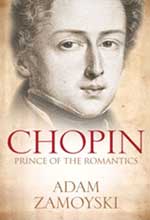NAPOLEON. THE MAN BEHIND THE MYTH
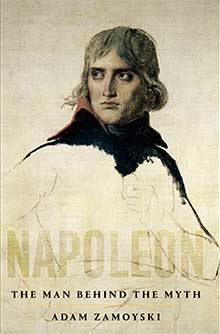
Napoleon inspires passionately held and violently conflicting visions. Was he a god-like genius, Romantic avatar, megalomaniac monster or just a nasty little dictator?
He was none of these things. He was a man, and as Adam Zamoyski presents him in this landmark biography, in many ways a rather ordinary man at that. He possessed almost superhuman qualities and talents, but it is hard to credit genius to a general who presided over the worst (and self-inflicted) disaster in military history and who single-handedly destroyed the great enterprise of rebuilding a strong France which he and others had toiled so hard to achieve. A protean organiser and legislator whose charisma mobilised millions, he did leave an impressive array of laws and institutions which survive to this day, but perhaps his most persistent legacy is the self-serving legend he painstakingly crafted.
But he was no evil monster. He could be selfish and violent, but there is no evidence of him wishing to inflict suffering gratuitously. His motives were mostly praiseworthy and his ambition no greater than that of contemporaries such as Alexander I of Russia, Wellington, Nelson, Bernadotte and many more. What made his ambition exceptional was the scope it was accorded by circumstance.
Adam Zamoyski strips away the lacquer of prejudice, explodes accepted myths and debunks long-held assumptions to reveal a more human, more understandable and far more interesting Napoleon. He places him firmly within the context of his times, showing how in the 1790s, this provincial youth was propelled into a political scene racked by revolution and a world at war. His insecurities, social, physical and sexual – turned his struggle for survival into a self-perpetuating quest for acceptance through the pursuit of ever greater power, which led to his final defeat in 1815.
Based on primary sources in many European languages, and beautifully illustrated with portraits done only from life, this magnificent book examines how Napoleone Buonaparte, the boy from Corsica, became ‘Napoleon’; how he achieved what he did, and how it came about that he undid it. It does not justify or condemn but seeks instead to understand Napoleon’s extraordinary trajectory.
Extracts from reviews of NAPOLEON. THE MAN BEHIND THE MYTH
‘Napoleon is an out-and-out masterpiece and a joy to read.’
‘The emperor has had few biographers who address this shooting star with Zamoyski’s narrative power and nuanced judgment.’
‘Zamoyski’s research is meticulous, his writing sublime.... This is probably one of the truest biographies of Napoleon.... this book undoubtedly needed to be written.’
‘The real value of this wonderful biography – elegantly written, exhaustively researched and compellingly argued – is the insight it gives us into Napoleon the Man.’
‘The refreshing distinction of Zamoyski as a biographer is that he humanises Bonaparte…In portraying the person behind the many myths that have accrued around his name, Zamoyski acts as a skilful picture-restorer, scraping away layers of lies, exaggerations and misconceptions to reveal the man in his true, unvarnished colours.’
'Always elegant in style and original in analysis, Zamoyski, a master of the sources and the culture and politics that created his subject, produces a fresh, nuanced, beautifully written, gripping and outstanding biography of Napoleon…'
‘...magnificent’
'A lifetime's diligent research and profound thinking about Napoleon and his times has gone into this hugely readable, highly enjoyable and well-balanced biography. Zamoyski is at the top of his game as a biographer.'
'Adam Zamoyski has retold a story that we thought we knew and made it fresh. Stripping away two centuries of mythology, discarding the apocryphal stories and legends, he finally brings us the real Napoleon.'
‘Zamoyski deserves praise for his selection of sources. Unlike some recent works that rely on the accounts of contemporaries who abhorred Napoleon, Napoleon: A Life incorporates the voices of those who were both for and against him, and, even more important, those who were observers and not politically polarized ... Although his book fills more than 700 pages, it moves quickly, and Zamoyski adeptly avoids getting bogged down in any specific topic ... one of the finest biographies of Napoleon Bonaparte ever written.’
‘Engaging and highly readable ... What sets Mr. Zamoyski apart from countless other biographers is his ability to (1) provide context to the factors that made Napoleon a constant warrior and (2) to explore his restoration of order to post-revolutionary France ... An inclusive life of a historical dynamo.’
PHANTOM TERROR
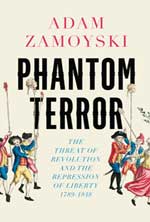
The French Revolution and the bloodcurdling violence it engendered terrified the ruling and propertied classes of Europe. Unable to grasp how such horrors could have come about, many concluded that they were the result of a devilish conspiracy, hatched by Freemasons, inspired by the ideas of the Enlightenment with the aim of overthrowing the entire social order, along with the legal and religious principles it stood on. Others traced it back to the Reformation or the Knights Templar, and ascribed to it even more sinister aims.
Faced by this apparently occult threat, they resorted to repression on an unprecedented scale, expanding police and spy networks in the process. Napoleon managed to contain the revolutionary elements in France and those parts of Europe he controlled, but while many welcome this others saw in him no more than the spawn of the Revolution, propagating its doctrines by other means. After his defeat at Waterloo in 1815, the victors united in a Concert of Europe dedicated to the maintenance of the old order, the suppression of all opposition, and the ferreting out of the conspirators whom they believed to be plotting mayhem and murder in the shadows.
In this groundbreaking study, bestselling historian Adam Zamoyski exposes how the rulers of Europe resorted to a pusillanimous yet cynical use of the police spy and the bayonet, which only intensified their own fears and pushed ordinary people towards subversion, building up the pressure of opposition to their rule. This compelling history, occasionally chilling and often hilarious, tells us a great deal about how the modern state evolved through the expansion of its organs of control, and holds urgent lessons for today.
Extracts from reviews of PHANTOM TERROR
‘Phantom Terror is a timely and original history book, a brilliant guide to the past which will inspire reflections about the present as well.’
‘This is revisionist history at its absolute best.’
‘A memorably impressive and important book. Phantom Terror is scholarly, well-written and enjoyable, with fascinating insights on almost every page.’ –
‘Elegant and panoramic.’ –
‘Splendidly provocative… full of arresting details and sharp asides… a thumping great pleasure to read. Zamoyski’s cool scepticism, which uses the anxieties and crises of the past to illuminate some of our contemporary assumptions and obsessions, is history at its best.’
‘Vivid, terrifying and often quite funny.’
‘Scintillating and original.’
'This book is both very enjoyable and timely.'
'The pace is brisk, the vignettes evocative, the anecdotes well chosen. ... There is much enjoyment to be found in this long but entertaining book.'
CHOPIN, PRINCE OF THE ROMANTICS
Few composers elicit such strong emotions as Chopin. Few have been more revered and cherished. And few had had so much sentimental nonsense written about them. Adam Zamoyski’s compelling new biography cuts through the mass of anecdote and myth that has sprung up around the composer’s life and the ebullient and striking personalities of Romantic Paris among whom he lived, which included Liszt, Berlioz, Victor Hugo and George Sand, in search of the real Chopin. Zamoyski brings to the subject an unrivalled knowledge of the historical, social and cultural background of the composer’s native Poland as well as of the France in which he spent most of his creative life. He has scoured the archives of Warsaw, Krakow, Paris and London in his quest for the truth, and has based his account exclusively on primary sources and contemporary accounts.
The result is a biography of authority, perception and wit. Chopin emerges from the sugary romantic mist in which he has been shrouded as a real, palpable personality, a man of intelligence and humour; in music and innovator of genius; in business a feckless spendthrift; in love hesitatnt and tender; in friendship passionately loyal but often intolerably exacting. Through a close reading of his letters and the use of everyday detail, Zamoyski draws the reader into the private world of this most complicated and reticent of men – ‘a man made for intimacy’, as the poet Heinrich Heine called him – and reveals the real passion, suffering and ultimate tragedy of his life.
Extracts from reviews of CHOPIN, PRINCE OF THE ROMANTICS
‘Zamoyski’s highly readable account brings non-technical insights to the music itself and he is superb at conveying what is known of Chopin’s own playing. Cutting through the sugary image that still mars Chopin’s reputation in some quarters, he shows how the composer’s gods were Bach and Mozart, not the ‘father’ of musical Romanticism, Beethoven.’
‘Scholarly yet highly readable’.
‘Such a biography is really successful only if it manages to enhance a reader’s understanding and enjoyment of the music. Zamoyski does not describe a single bar of Chopin, but in drawing a close, intimate and thoroughly absorbing portrait of the man, he had me bounding between pages to the CD player where I found new levels of pathos emerging from the music. … a thoughtful, lively and moving account of an extraordinary and exceptional man…’
‘Zamoyski is terrific at probing the subtle contradictions of Chopin.’
‘Those seeking to revisit the genius of the man who Camille Saint-Saëns described as; the sweet evening star that shone only for a moment’ could do no better than to have this book at their side.’
POLAND
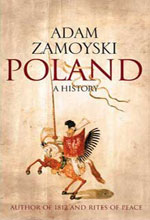
No nation’s history has been so distorted as that of Poland. In 1797 Russia, Prussia and Austria divided the country up among themselves, rewriting history to give the impression that Poland had never been a fully sovereign state, only a backwater that needed civilising. In fact the country they had wiped off the map had been one of the largest and most richly varied in Europe, embracing a wide variety of cultural and religious traditions, accommodated within one of the boldest constitutional experiments ever attempted. Its destruction created an imbalance and initiated a series of struggles that culminated in the two world wars and the Cold War.
Today, after the turmoil of the past two centuries, Poland has re-emerged as one of the most homogenous and vibrant nations of Europe. Adam Zamoyski’s comprehensive but succinct and witty account of her thousand-year history goes a long way to explain how this has come about.
Extracts from reviews of POLAND
‘Fresh, different, and brilliantly readable, a book which feels something like an extensive, chatty letter from on old friend. It is the perfect introduction for those who know nothing about the country, yet will also provide some positive food for thought to those who imagined the knew it all too well.’
‘Excellent and authoritative… Such an extraordinary national trajectory demands an accessible and scholarly accounting. Zamoyski succeeds admirably in providing both.’
‘Invaluable and eye-opening.’
‘This is an excellent book for those new to Polish history, including perhaps those planning a trip to Poland.’
‘Wise and thoughtful’
WARSAW 1920
Lenin’s Failed Conquest of Europe
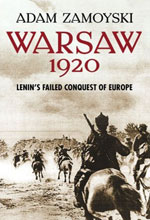
In the summer of 1920, outside the gates of Warsaw, there took place a battle that ranks alongside Marathon and Waterloo for its influence on the course of history. Yet, dramatic as it was and fateful though its consequences were, the story of how Lenin came within a hair’s breadth of shattering the Versailles peace settlement and spreading Bolshevism from Russia to western Europe has been largely forgotten.
In 1920 the new Soviet state was a mess, exhausted by a bloody civil war. The best way of ensuring its survival appeared to be to export the revolution to Germany, itself economically ruined by defeat in World War I and racked by internal dissension. Between Russia and Germany lay Poland, only recently restored to independence, and determined to hold on to it. But Poland was weak and her allies Britain and France, themselves fearful of social revolution, were in no position to help.
Adam Zamoyski describes how – in what became known as the ‘Miracle on the Vistula’ – the Polish army, led by self-taught general and former terrorist Józef Piłsudski achieved at the last minute one of the most decisive victories in military history, in which aeroplanes proved useless and tanks were swamped by swirling masses of cossacks and lancers in scenes reminiscent of the Napoleonic wars.
The shattering defeat his armies suffered in the battle for Warsaw forced Lenin to settle for communism in one country, while another major actor in the events, Joseph Stalin, nursed a grudge and a longing for revenge that he would fulfil in 1939.
Extracts from reviews of WARSAW, 1920
‘Warsaw 1920 is battle history of the best kind. The international setting and the political context are gracefully sketched in, and Zamoyski integrates the voices of contemporaries to create a symphonic, three-dimensional chronicle. He conveys with consummate skill the movement of men across terrain, showing how the balance of forces shifted from one week to the next. His account of the two armies is highly textured and enlivened by evocative portraits of the most important personalities…’
‘The book reads like a Boy’s Own yarn and is well worth it for that alone.’
‘The mark of agreat military historian is not only to do the battlefield descriptions and explain the tactics, but to give the political context and bring the characters of the commanders to life. Zamoyski manages it all in this concise and thrilling account of a forgotten war.’
‘For the greater part, it is a battlefield book and not a political one. In describing these battles, without losing sight of their great political consequences, Zamoyski shows himself to be a master. …with a rare capacity for casting light into dark corners, to pierce the fog of war and to make what at first seems incomprehensible easy to understand – processes which are greatly facilitated by a series of excellent sketch maps. Zamoyski’s battle pictures, indeed, are reminiscent of Tolstoy and they have the added advantage of of being without the latter’s rather strange view of history.’
‘In this fine piece of historical resurrection, Zamoyski writes with thrilling immediacy and dramatic effect about a conflict of huge import that has been overlooked by almost everyone but the Poles themselves.’
‘The quality and excitement of the very best historical novels.’
RITES OF PEACE
The Fall of Napoleon and the Congress of Vienna
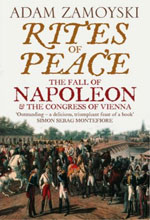
In the wake of his disastrous Russian campaign of 1812, Napoleon’s imperious grip on Europe began to weaken, raising the question of how the Continent was to be reconstructed after his defeat.
There were many who dreamed of a peace to end all wars, in which the interests of peoples as well as those of rulers would be taken into account. But what followed was an unseemly and at times brutal scramble for territory by the most powerful states, in which countries were traded as if they had been private estates and their inhabitants counted like cattle. The result, fixed at the Congress of Vienna in 1815, not only laid the foundations of the European world we know. It put in place a social order and a security system that remained in place until 1914. When that system fell apart, the tensions it had contained came to the fore with disastrous results, in the shape of rabid nationalism and militant socialism. The events described in this book therefore lie at the root of many of the problems that still dog the world today.
Although the difining moments took place in Vienna, and the principal players included Tsar Alexander I of Russia, the Austrian Chancellor Metternich, the British Foreign Secretary Lord Castlereagh, the Duke of Wellington and the French master of diplomacy Talleyrand as well as Napoleon himself, the accepted view of a gathering of consummate statesmen reordering the Continent in elegant salons is a false one. Many of the crucial questions were decided on the battlefield or in squalid roadside cottages amid the vagaries of war. And the proceedings in Vienna itself were not as decorous as is usually represented.
Drawing on a wide range of first-hand sources in six languages, which include not only official documents, private letters, diaries and first-hand accounts, but also the reports of police spies and informers, Adam Zamoyski gets below the thin veneer of courtliness and reveals that the new Europe was forged by men in thrall to fear, greed and lust, in an atmosphere of moral depravity in which sexual favours were traded as readily as provinces and the ‘souls’ who inhabited them. A chilling account, full of menace as well as frivolity.
Extracts from reviews of RITES OF PEACE
‘Deeply researched, elegantly written, gleaming with the political and sexual depravity of the Congress that decided the fate of Europe, Zamoyski’s Rites of Peace is outstanding - a delicious, triumphant feast of a book.’
‘Zamoyski’s account of the labyrinthine twists of diplomacy is both masterly and exhaustive… I closed this book full of admiration for its author.’
‘An exhilarating book … not since Margaret MacMillan’s instant classic on the Treaty of Versailles has there been a book on diplomacy of such richness and readability. Zamoyski advances his case with a story-telling detail that makes his book hard to put down [and] has achieved a rare feat. He has taken the driest of diplomatic archives and turned them into a compelling narrative.’
‘Magnificent… both an intellectual and a literary joy to read… the work of an accomplished raconteur and a formidable scholar. I doubt there will be many more important or rewarding books than this published this year.’
‘Zamoyski writes elegantly and vividly, and deftly balances the complex details of the negotiations with colourful portraits… [his] achievement is to have brought to life one of the great turning-points in European history.’
‘Zamoyski has covered this maddenlingly complicated period with scholarship, comprehension and detachment… [he] has given us an intimate understanding of this most complex of times.’
‘In this sophisticated, panoramic account of Europe’s transition from war to peace in 1815… Zamoyski succeeds brilliantly, balancing the many strands of his narrative with intelligence and grace. Lucid overviews of high politics … are interspersed with vivid set-pieces, telling anecdotes and poignant individual portraits. Rites of Peace is a fine example of narrative history.’
1812
Napoleon’s Fatal March on Moscow
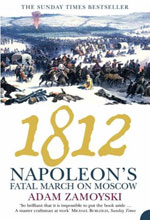
Napoleon’s invasion of Russia and the terrible retreat from Moscow were a military epic and a human tragedy on a colossal scale – history’s first example of total war. But the campaign of 1812 was not just a war on Russia: it was the climax of a long duel between two emperors for supremacy in Europe, between two vast empires, and two utterly alien cultures, and its outcome affected the course of the continent’s history over the next two centuries.
Napoleon’s Grande Armée, the largest ever seen, had Spanish and Portuguese, Italians and Poles, Germans and Croats, Dutchmen and Swiss as well as Frenchmen in its ranks. He launched it into the huge expanses of Russia, where it could find neither food nor water. When the Russians finally made a stand at the gates of Moscow, the ensuing battle was a slaughter the lie of which would not be seen again until the first day of the Somme in 1916. The sufferings of the soldiers and their camp followers on the wintry retreat from Moscow are almost unbearable to read about.
In this gripping and masterly account, Adam Zamoyski has drawn on the latest Russian research as well as a vast pool of first-hand accounts in French, Russian, German, Polish and Italian to paint a vivid picture of the experiences of soldiers and civilians on both sides of the conflict. He charts the complex relationship between Napoleon and Tsar Alexander with great skill, and shows how it came to distort their alliance and bring about a war that neither wanted.
Extracts from reviews of 1812, NAPOLEON'S FATAL MARCH ON MOSCOW
“Adam Zamoyski’s account of the 1812 campaign is so brilliant that it is impossible to put the book aside. . . . Zamoyski is such an economical and elegant writer that one could overlook the amount of difficult original material he has read in so many languages. His grasp of both the big picture and of the significant detail reveals a master craftsman at work. . . . This is a great book, about what might be called the first total war.”
“A harrowing account of the retreat of Napoleon’s men from Moscow... This is an utterly admirable book. It benefits from a far wider range of sources (including Russian and Polish) than previous works, and combines clarity of thought and prose with a strong narrative drive.”
“Zamoyski elegantly delivers gripping storytelling, bold revisionism, and poignant suffering... The agony in the retreat . . . is graphically told in heartbreaking detail... Adam Zamoyski has reexamined the evidence and created a modern account that... takes a giant step closer to how it really was.”
“A magnificent book. . . . No review can do justice to the scholarly integrity and human sensitivity of this book, or to the horrors it describes. I could not sleep after reading his description of the last days of the French retreat... One of the greatest stories ever told.”
“Powerful... A brilliant piece of narrative history, full of sparkling set-pieces, a wholly fascinating account of what must be reckoned one of the greatest military disasters of all time... Zamoyski’s exposition of the 1812 campaign is a model of elegant clarity.”
“Zamoyski’s achievement rests on firmer foundations than previous studies. No historian has
“Napoleon’s invasion of Russia in 1812 is a dark and starry epic, about which hundreds of books have been written and then some. Now, almost two centuries after that drama, Adam Zamoyski’s Moscow 1812 is more than one of the best; it is perhaps the best – because of its scope, its profound character, and the excellence of his prose.”
“It is one of history’s great stories of hubris and tragedy, not to mention a titanic clash of personalities and men – and it’s all here in Adam Zamoyski’s Moscow 1812. Told with vigor, sweep, and insight, Moscow 1812 brings this epic moment to life in a thoroughly fascinating way. Zamoyski’s book will stand as one of the best accounts of this drama.”
HOLY MADNESS
Romantics, Patriots and Revolutionaries 1776-1871
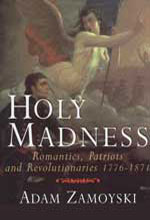
There has been no lack of books on the 'Age of Revolution', on the rise of nationalism and on the birth of the modern world. But they have all been strongly marked by simplistic orthodoxies, such as the Marxist view that revolutions were an inevitable part of a great economic process. Or that upheavals took place because people were poor or hungry or downtrodden. These books resolutely ignore such inconvenient truths as that it was not the poor who made the revolutions. They also ignore any underlying spiritual and emotional forces at work. They make only the most superficial connections with the Romantic Movement in literature and the arts, and do not go into its deeply religious undertow.
Holy Madness sets out to make some of these connections. It probes into the psyche that was responsible for so many of the founding events of our modern world, and into the instincts that inspired its most generous and most murderous impulses.
This book explains how the Enlightenment dislodged Christianity from its central position in the life of European societies and how man's quest for ecstasy and transcendence flooded into areas such as the arts, spawning the Romantic movement. The religious themes in art gave way to political and social ones, and art, literature and music became substitute religions, offering solace and the possibility of attaining the sublime. In the late eighteenth and early nineteenth century this secular quest for salvation also invaded politics, giving rise to a widespread desire to bring into being ideal communities.
This book traces how worship and dedication originally channelled through the church was refocused on the cause of the people and the nation. This dramatic journey which begins in America in 1776 and goes right up to the last agony of the Paris Commune in 1871, takes in the French revolution, the Irish rebellion, the Polish risings, the war of Greek liberation, the Russian insurrection, the Hungarian struggles for freedom, the liberation of South America, and the Italian Risorgimento. Generations of young men struggled and died in a kind of crusade whose Jerusalem was an idealised nation, death in the service of which brought martyrdom and redemption.
On a vast canvas, Zamoyski combines a wonderfully illuminating and thought-provoking exploration of this fascinating theme with portraits of the key people involved: Lafayette, Garibaldi, Lamartine, Kossuth, Mazzini, Napoleon, Paine, Benjamin Franklin, Kościuszko, Coleridge, Byron, Mickiewicz, Bakunin, Rousseau, Wolfe Tone, Bolivar, Herzen and many others.
back to topExtracts from reviews of HOLY MADNESS
“Holy Madness is deceptive, a scholarly work written so attractively that it is easy to miss the deeep themes which bring unity and purpose to the book.”
“Adam Zamoyski has written a history of revolutions, and of the romantic and sometimes ridiculous revolutionaries who inspired them. But because revolution was so ubiquitous an activity in the 19th century what he has actually produced is a comprehensive account of Western civilisation from 1776 to 1871... Zamoyski manages to flesh out these events with well-chosen detail and a fine sense of the touching comic-heroics they often entailed as well as the blood-letting and the horror...this is thought-provoking and well-made historical writing.”
“Adam Zamoyski's dashing account of the romantic movement, Holy Madness, is bold narrative history at its most imaginative.”
“A benchmark that will revise our reading of this vivid period: that between the onset of the two Industrial Revolutions, between Blake and Balzac, which saw the birth and rise, not just of nationalism, but of internationalism.”
“Zamoyski is a fluent and entertaining writer, and has been greatly praised for the style, sweep and authority of his previous books...an ambitious and in many ways brilliant book.”
“Zamoyski's main narrative is is a rivetting tale of the standard bearers of nationalism from Jefferson to Garibaldi and from the American War of Independence to the Paris Commune of 1871. He achieves striking effects both through antinomy and a quasi-cinematic montage...a page-turner.”
“Adam Zamoyski, thankfully, has done [History] a splendid service. In this provocative book he reveals the vitality and importance of the religious impulse in explaining the revolutions, turmoil and nationalism of the years 1776-1871...The scope ofHoly Madness extends from America's fight for independence to the Paris Commune. An exotic collection of fanatics, adventurers, poets and thinkers are brought to life...Readers will be moved by Zamoyski's arrestingly written book to admiration for those often deluded Lafayettes and Garibaldis.”
“Zamoyski is marvellous the way he develops so many ideas, showing the way that the new patriotism replaces religion and develops its own iconography in overtly religious terms, and the way that this revolutionary patriotism becomes, later, the parent to both fascism and communism.”
“Zamoyski's canvas is so huge that sometimes he only skims the surface... But there will be few who will not learn much from him, and the elegance of his style makes him a real pleasure to read.”
“Ambitious, stimulating and disturbing....the parade of heroism and folly he presents makes a riveting spectacle.”
“Adam Zamoyski's brilliant book will certainly become a classic of its kind. He covers not just France, Italy and Germany, but the whole of Europe – Spain, Poland, Ireland, Hungary, Russia, the Balkans, not forgetting Greece and, most significantly, America.”
“Splendidly descriptive, full of music and colour...both charming and learned.”
THE LAST KING OF POLAND
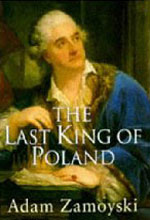
The last king of Poland owed his throne largely to his youthful romance with the future Catherine the Great of Russia. But Stanislaw Augustus was nobody's pawn. He was an ambitious, highly intelligent and complex character, a dashing figure in the finest eighteenth-century tradition, He was a perfect illustration of the contraditctions of Europe's ideological and religious viewpoints; he worshipped reason but was led by the heart; professed Catholicism but believed in Providence; toyed with the occult and practised freemasonry. A great believer in art and education, he spent fortunes on cultural projects, and finding that he was blocked politically by Catherine, he put his energies into a programme of social and artisitic regeneration. He transforemd the mood of his country and brought it to a new phase of reform and independence, culminating in the passing of the constitution in 1791, hailed in Britain, France and the United States as one of the greatest events of the century.
Poland's neighbours, however, viewed this beacon of liberty in their midst with alarm, and as they invaded and partitioned it, Stanislaw was obliged to watch the destruction of his life's work, and ultimately forced to abdicate, a broken man, deceived and disillusioned.
The Last King of Poland is the rich and enthralling story of a personal dream with all ethe elements of grand tragedy, and at the same time an important chronicle of the birth and death of liberalisn in Poland and the establishment of Russian power in Europe.
back to topExtracts from reviews of THE LAST KING OF POLAND
'A tragic tale beautifully told. Zamoyski's prose does not dazzle, nothing is strained, it is cool and pellucid. He is a great writer and his biography is very readable and instructive.'
'Intelligent, impressively researched, beautifully written.'
'His wonderfully fresh and vigorous style carries even the ignorant reader easily through a historical tangle which in most other authors would remain indigestible and wearisome.'
'Writing eastern European history is almost literally a nightmare: a surface of operetta, beneath which lurk endless, apparently pointless, complications, all ending in disaster. Adam Zamoyski has risen with great triumph above this, and has contributed a work of real scholarship that is also remarkably easy to read. He has written before - a good life of Chopin, an excellent one of Paderewski - but has not done better than this book: its sources are original and multilingual, its understanding of 18th-century politics and diplomacy is impeccable.'
'This sparkling study is both a fascinating biography and a pertinent reminder of the past instability of Eastern Europe.'
'This is an exhilarating, flawlessly disciplined performance. A biography of the unfortunate Stanislaw Poniatowski, written with tremendous brio and full of shrewd sidelights on the tyrannical imperatives of international politics then and now.'
'This is a book that anyone charged with responsibility, or who cares about power and its use, would do well to read.'
'Zamoyski's biography of Stanislaw August, elegantly written and thoroughly researched, rises fearlessly over partisan opinions, and reviews the evidence step by step through the labyrinthine domestic and international convolutions of half a century. In the end, Zamoyski comes down convincingly on the side of a much suffering and much misunderstood monarch. One can read the book as an object lesson in the way that political power not only corrupts the powerful but also distorts the reputation of the losers. It can also be read as a corrective to the denigratory opinions about eastern Europe which still proliferate. It can even be read for the extraordinary ironies and echoes which reverberate between the 'progressive' politics of the enlightened despots and the recent pseudo-progress of the Soviet bloc. Above all, one can read it as a delightful example of the biographer's art, with a text as sensitive to the subject's personality as it is expert in the affairs of the subject's times.'
'The Last King of Poland is a magnificent panorama of one of the saddest periods in Poland's history. Zamoyski's eloquent prose drove me into several days of depression pondering on Poland's tragic fate.'
'There can be few writers as well qualified as Adam Zamoyski to assess the life and work of Poland's last king. Not only is he a master of the art of biography but he also possesses a sound knowledge of Polish political and cultural history and is able to place it well within a wide European context. Zamoyski's book is an outstanding achievement.'
'It is, to be sure, a tale full of pathos; and Zamoyski tells it well.'
'A fine book, The Last King of Poland marries freshness of scholarship with a welcome, accessible approach. It scores on numerous counts. Early amours are depicted with Mozartian charm; the web of political intrigue unfolds like an appetising detective novel.'
THE FORGOTTEN FEW
The Polish Air Force in the Second World War

The part played by the Poles in the air during the Second World War and the colourful stories of their doings have become part of British folklore. But very few people have any idea of the extent of their involvement, or how they came to be in Britain in the first place.
More than 150 Polish pilots took part in the decisive phase of the Battle of Britain in 1940. By the beginning of 1941, there was a fully fledged Polish Air Force operating alongside the RAF. With 14 squadrons and support services, it was larger than the air forces of the Free French, Dutch, Belgians and all the other European Allies operating from Britain put together. Some 17,000 men and women passed through its ranks while it was stationed on British soil. They not only played a crucial part in the Battle of Britain, they also contributed significantly to the Allied war effort in the air overall, and took part in virtually every type of RAF operation, including the bombing of Germany, the Battle of the Atlantic and Special Operations.
This book is not intended as a full history of the Polish Air Force. Nor does it pretend to assess the exact contriubtion of these men and women to the Allied cause. The intention is to give a picture of who they were, where they came from, how they got here and what they did. Also to take a look at their, at times, strained but ultimately successful collaboration with the RAF and their sometimes difficult, often notorious, but ultimately happy relationship with the British people.
A final chapter recounts the fate of those who returned to Poland, where many faced Communist firing-squads, and of those who stayed behind to build a new life for themselves in Britian and other Western countries.
back to topExtracts from reviews of THE FORGOTTEN FEW
'Zamoyski's affectionate tribute is both disarmingly honest and impressively researched. The result is a fascinating and superbly told story.'
'Adam Zamoyski has written a moving book full of lively anecdotes and memories, but also of sharp insights into political, military and especially wartime social and cultural history. Its striking achievement is to make vivid the characters of these forgotten few and their post-war fate.'
'Zamoyski handles the story with the verve and wit we have come to expect of him.'
'Adam Zamoyski treats his subject not with the heavy hand of military scholarship, but generally with a light and easy touch. He deserves our thanks for writing such an absorbing account of what the Polish Air Force achieved from its fighter and bomber bases in a battered Britain.'
'In spite of the great betrayal and the enormity of Polish suffering and sacrifice, Zamoyski's is an incredibly colourful and humorous book detailing many heroic, bizarre and funny exploits.'
'Anyone interested in flying - or in sheer human courage and dedication - is sure to enjoy this book, which is remarkable for its balance as well as for the thrilling, tragic story it tells.'
'Adam Zamoyski tells a marvellous and often humorous adventure story, full of bravery, commitment, pride, and determination.'
'Jak pisze autor, nie bylo jego zamiarem napisanie pelnej historii lotnictwa polskiego. Niemniej, ksiazka jego jest miniatura historyczna w jak najszerszym tego slowa znaczeniu. To, ze jest to miniatura, a nie sucha historia, daje latwosc czytania.'
THE POLISH WAY
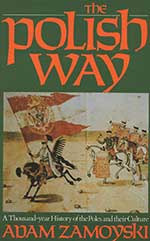
A lavishly illustrated history, from the tenth century to the present day, tells of Poland’s achievement as a European nation: a subject that has occupied historians far less than the woes that have beset her people.
Here is a country that was one of the first in Europe to enshrine a measure of personal liberty in law, that was second only to Iceland in evolving a parliament. The Renaissance manifested itself much more strongly in Polish culture than in its neighbours’. Poland enjoyed religious peace while others were divided into the murderous factions of the Reformation and Counter Reformation. Its victories over Teutonic Knights, Tatars and Turks, and effortless conquest of Moscow, won it a reputation for a century and more as the most formidable military force in Europe. Its Constitution of 1791 lit a brief beacon for the liberal world, while sealing its own doom.
Adam Zamoyski demonstrates the continuity underlying the apparently discontinuous history of the Polish people, and reveals much in Poland’s past that must be grasped for any understanding of what is happening in the country today – in parliamentary politics from the fourteenth to the eighteenth centuries, in the religious issues that have dominated public life, in Polish literature, art and architecture.
The colour and monochrome illustrations, most of them published here for the first time outside Poland, provide a striking record of Polish attitudes and tastes, and illuminate that curious mixture of Eastern and Western influence which make up Polish culture.
Extracts from reviews of THE POLISH WAY
‘A rich and delightful book.’
‘Adam Zamoyski's study...is lavishly illustrated, agreeably written, and...provides a lucid and wide-ranging survey of Polish cultural development.’
‘The Polish Way will be ranked as one of the foremost Anglo-Saxon contributions of the decade to popularising the history of Poland. It is the coming of age of a writer of great intelligence, beautiful style, and a wise sense of humour.’
‘Excellent...superbly illustrated...recounting Poland's dramatic history from the earliest times to the present day, spanning the colourful sweep of Poland's heroic past with selective vision, a masterly grasp of the source material and a perceptive eye for the telling anecdote.’
‘The most rewarding book of the year.’
‘The book blends broad brush strokes with pointillist detail in a marvellously satisfying and gripping way and has immediately taken its place as the outstanding study in this field.’
‘Erudite and at times extremely perceptive...vigorous and readable...I shall frequently return to this beautifully illustrated book.’
PADEREWSKI
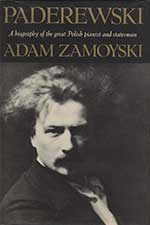
Hailed as a genius and national hero, likened to Einstein and Gandhi, Paderewski rose from provincial obscurity to become the most famous pianist in history – the twentieth century’s first superstar – as well as Prime Minister of Poland. For more than fifty years, until his death in 1941, he was a household name, and all over the world “Paddymania” was rife. Audiences swooned – at least a dozen ladies had to be “carried out in a fainting condition” when he performed in Edinburgh in 1894; he was mobbed in Paris, London and all over America, besieged with love letters and proposals of marriage. Critics eulogized – James Huneker found his playing “totally overwhelming”, and even George Bernard Shaw admitted that Paderewski’s musical “intelligence” permitted him to seize ten nuances in a composition for every one the average pianist picked out. Advertisers swore by him; the press explored minutest details of his life. Heads of state received him – he played for Queen Victoria at Windsor, and for Woodrow Wilson at the White House; he was admired by politicians from Lloyd George to Mussolini, by artists from Conrad to Burne-Jones and Saint-Saëns. Why then, after his death, did Paderewski come to be largely forgotten?
Adam Zamoyski sets out not only to reassess Paderewski’s achievements, but to revive, with the help of new research, the astonishing story of his life. It is a story with elements of both the fairy tale and the melodrama, in which – despite the trials of his early life, his chaotic musical education, his tragic first marriage, and the initial hostility of audiences and critics – Paderewski’s fanatical ambition to “do something for Poland” drives him to unprecedented success.
Drawing on a wide range of contemporary sources, Zamoyski unravels facts from the legends that grew up around the pianist-statesman. He clarifies Paderewski’s extreme personality, his complex romantic life, his musical and political careers; and above all he attempts to solve the mystery of his undeniable, irresistible power.
Extracts from reviews of PADEREWSKI
‘Zamoyski, to whom we already owe an interesting study of Chopin, knows Polish and has access to archives not generally available. He has written a very readable and well researched account of a man who, despite massive success and a private life with more than its share of tragedy, never lost his sense of humour. It is a romantic story and the author tells it well.’
‘The portrait of the elderly Paderewski, after his resignation, living in Switzerland surrounded by a bevy of adoring women, is particularly convincing - and very sad.’
‘Adam Zamoyski has unearthed from many sources the true story of this remarkable man's achievements. Paderewski lives again in his immaculate phrasing and his entire life is examined in meticulous and rewarding detail.’
‘Paderewski was not only among the greatest of European pianists but a great patriot who helped to rebuild the Polish state. Adam Zamoyski has brought him alive for us, with new insights into his hitherto shrouded private life, and a judicious estimate of his public career in music and politics - a unique combination.’
‘In his Paderewski, Adam Zamoyski tells his splendid story in a brisk, informal style, and he has based it on wide and conscientious use of sources in America and England, as well as Poland. This is an excellent book for the general reader, and full of valuable sign-posts for specialists who want to follow up the amazing story in greater detail.’
‘A fascinating biography.’
